
Iain Dale 7pm - 10pm
6 December 2023, 10:42 | Updated: 6 December 2023, 11:03
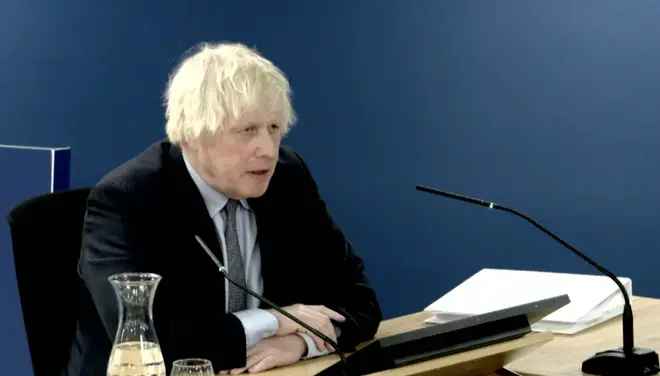
Boris Johnson's evidence at the Covid-19 inquiry was interrupted as he began an apology for the "suffering" during the pandemic.
Lady Heather Hallett ordered ushers to remove protesters from the hearing room, as the former prime minister started his evidence.
"Can I just say how glad I am to be at this inquiry and how sorry I am for the pain and the loss and the suffering of the Covid victims," Mr Johnson said.
Mr Johnson also defended lockdowns as "very important" but acknowledged "there is no denying the damage that was done".
He said that "as the pandemic recedes in public memory" there had been "an increasing tendency to criticise" the lockdowns.
"People point, quite rightly, to the loss of education, the economic damage, the missed cancer and cardiac appointments, and all the other costs.
"There is no denying the damage that was done. That is why that decision was so painful and so difficult."
But the former prime minister said the first lockdown came when there was a new disease with no treatment and which was not fully understood, so "we had to act".
"I believed strongly at the time, and continue to believe, that the lockdowns and other NPIs (non-pharmaceutical interventions) were very important," he said.
The first lockdown in March 2020 was "absolutely essential" in bringing down the R number - the rate at which people were being infected.
Four people who were removed from Boris Johnson's Covid-19 Inquiry hearing said they "didn't want his apology". They said they stood up as he began apologising to hold up signs that read: "The Dead can't hear your apologies."
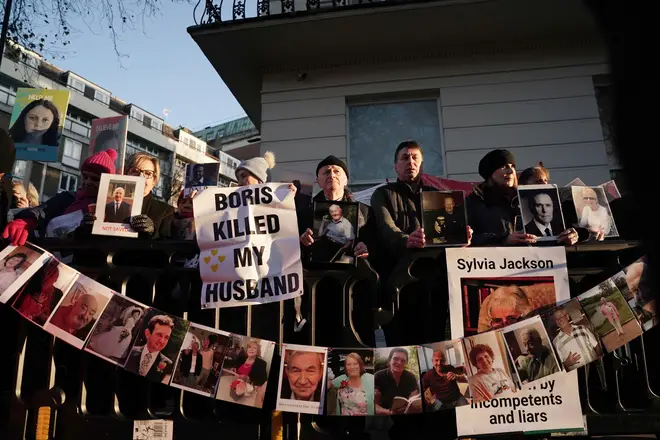
Speaking outside Dorland House in west London, Kathryn Butcher, 59, who lost her sister-in-law, told reporters afterwards: "We didn't want his apology.
"When he tried to apologise we stood up. We didn't block anybody. We were told to sit down.
"We didn't sit down straight away. One of us said stayed standing, so the rest of us came out in solidarity."
Mr Johnson was being grilled about the government's response to the pandemic.
In a much-anticipated evidence session, the former prime minister arrived three hours early ahead of facing questions about the timing of Britain's first lockdown and respond to criticisms from some of his closest aides about his leadership style.
Last week allies of Mr Johnson said that he would issue and “unreserved apology” and admit his government was “initially far too complacent” about the threats posed by the virus.
He is expected to talk with pride about the vaccine programme and argue the UK emerged from the final lockdown earlier than other comparable economies.
Mr Johnson is also expected to insist that all three lockdowns came at the right time and that his government saved hundreds and thousands of lives.
Last week, former health secretary Matt Hancock said imposing a lockdown three weeks earlier “would have saved many, many lives”.
Last month, the inquiry heard that senior advisers to Johnson had recommended the move on March 14.
Live: Boris Johnson faces questions at the Covid inquiry
Mr Johnson’s allies said he was likely to highlight remarks from UK scientists as late as mid-March urging a herd immunity strategy or warning of the risk of lockdown fatigue, with people growing weary of and disobeying rules if applied too soon.

Boris Johnson arrives at Covid-19 Inquiry
He is expected to stress that deciding on the second and third lockdowns, which came into force in England in November 2020 and January 2021, involved trade-offs between public health and economic considerations.
Mr Johnson is also likely to be asked about a claim, confirmed by insiders familiar with events, that he called on the security services in March 2021 to explore “military options” to obtain 5mn doses of the AstraZeneca vaccine from a Dutch factory after the EU threatened to impose an export ban.
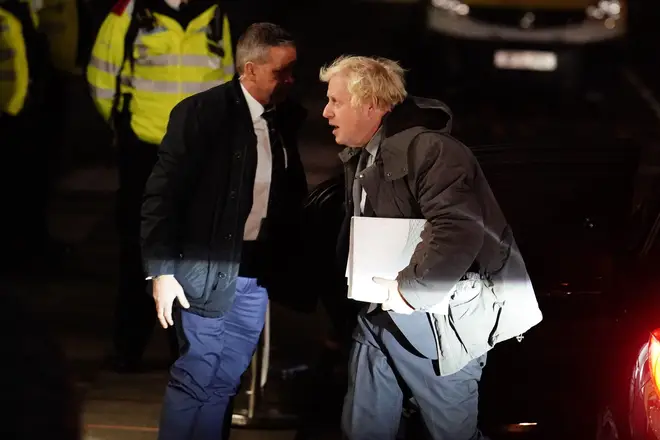
Read More: Live: Boris Johnson faces questions at the Covid inquiry
Read More: Boris Johnson 'to apologise at Covid Inquiry and admit mistakes' in next week's showdown
Read More: Boris Johnson to tell Covid Inquiry he 'delayed first lockdown based on Chris Whitty's advice'
It is understood Mr Johnson will claim he delayed implementing the first lockdown based on Sir Chris Whitty's advice.
He is expected to tell the hearing that given the "massive disbenefits" of lockdown, it was "obviously right" to ensure it was not implemented too soon.
He is anticipated to say Sir Chris told him that getting the timing of lockdown correct was "essential" as having one too early may have led to restrictions being in place for longer than the public could deal with.
The former prime minister is expected to describe how the meeting made him realise the limits of following the science, as tackling Covid involved "complex moral and political dilemmas" only an elected politician could deal with.
On February 28, 2020, Sir Chris is said to have warned Mr Johnson about the risks of Covid during a meeting in the Cabinet Room.
This is said to have raised the prospects of a lockdown for the first time.
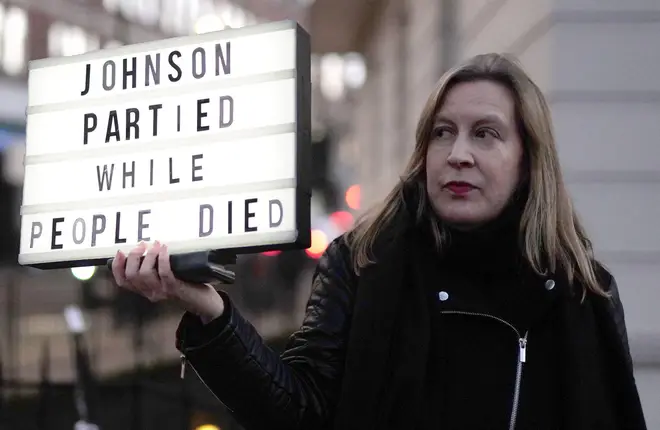
Read more: UK government was 'too late' to act in first wave of the Covid-19 pandemic, Chris Whitty admits
Read more: 'Old fashioned' ways are best to stay young: Chris Whitty reveals best ways to live longer
During an emergency Cobra committee meeting on March 9, Sir Chris argued that the timing of the measures was "crucial".
He also told ministers that "public compliance or despondence" depended on the timing of the measures.
Sir Chris reportedly described the impact on school children, the economy and people's mental health and life chances.
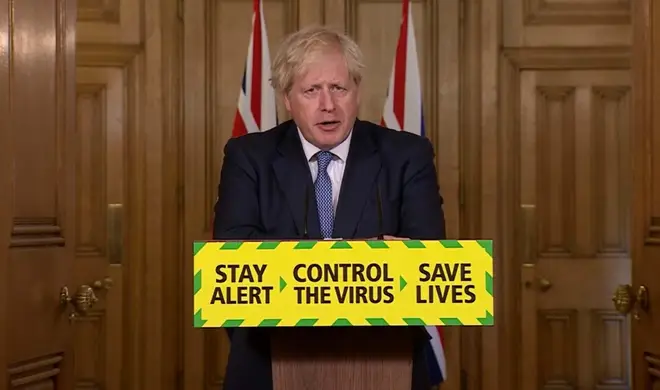
At a press conference later that same day, Sir Chris also purportedly said: "Once we have started these things, we will have to continue them through the peak and that is for a period of time and there is a risk that if we go too early, people will understandably get fatigued and it will be difficult to sustain.”
He also allegedly advised against banning mass gatherings while advising introducing quarantine for travellers from China.
The former prime minister is also expected to say that the advice from his adviser "made sense" and "was probably correct."
Mr Johnson is expected to add: "Given all the other massive disbenefits of lockdown, it was obviously right to time the measures so as to deliver the maximum impact."

Rachel Johnson and Ross Clark criticise the COVID Inquiry
Sir Chris, Sir Partick Vallance, who was the former chief scientific adviser, and Mark Sedwill, the former cabinet secretary, have all admitted that the government should have implemented a lockdown earlier.
Former health secretary, Matt Hancock, has openly admitted that the lockdown should have been announced three weeks earlier.
Sir Chris previously told the inquiry that he wanted to minimise the loneliness and missed schooling lockdown brought.